人教版新课标英语必修一Unit 2 English around the world Reading 课件(共38张PPT)
文档属性
| 名称 | 人教版新课标英语必修一Unit 2 English around the world Reading 课件(共38张PPT) |

|
|
| 格式 | pptx | ||
| 文件大小 | 3.1MB | ||
| 资源类型 | 教案 | ||
| 版本资源 | 人教版(新课程标准) | ||
| 科目 | 英语 | ||
| 更新时间 | 2021-02-09 00:00:00 | ||
图片预览

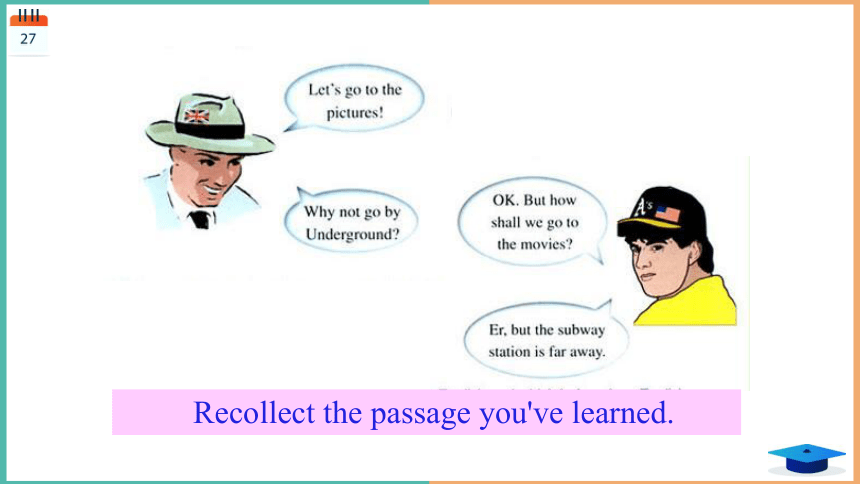
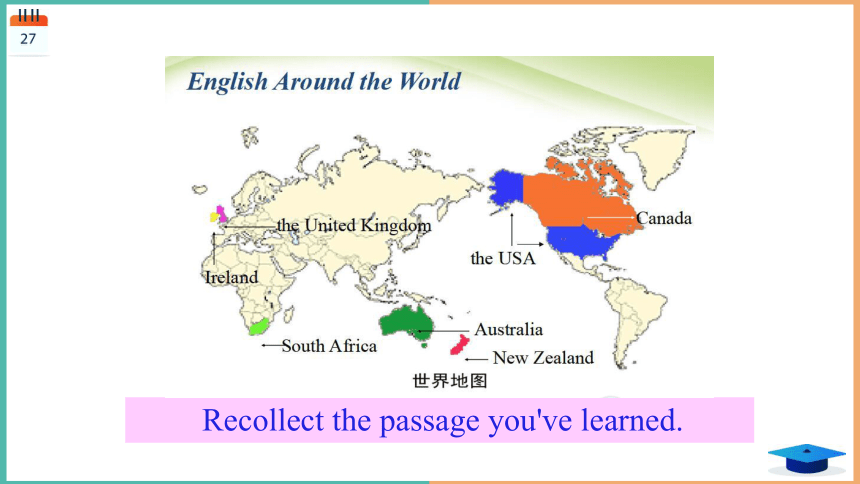
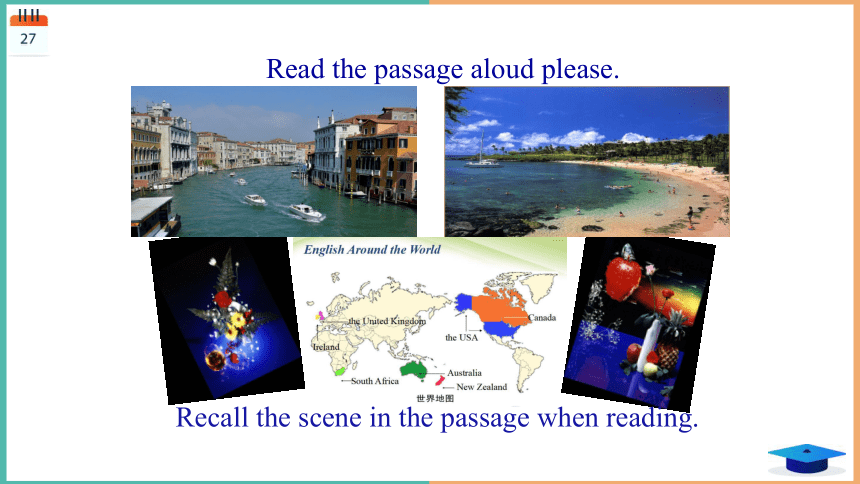
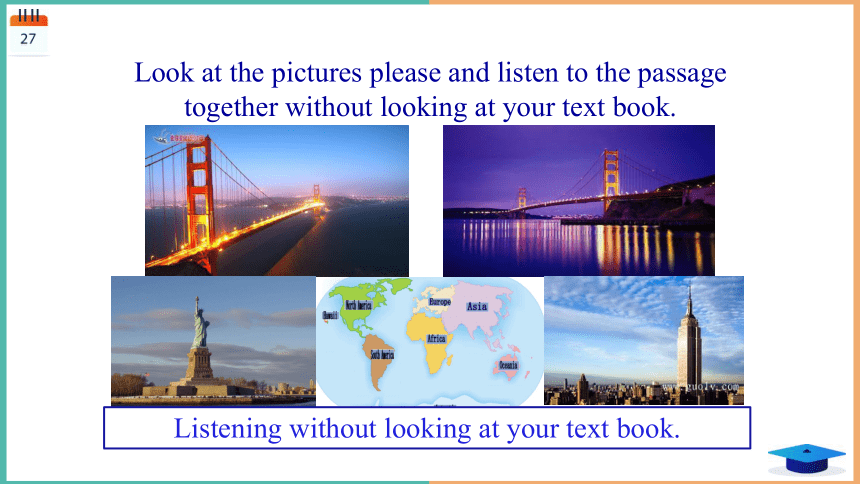
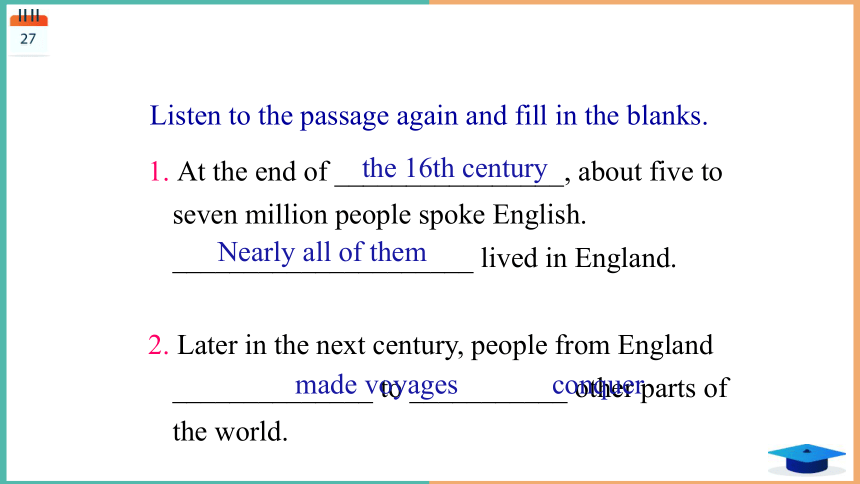
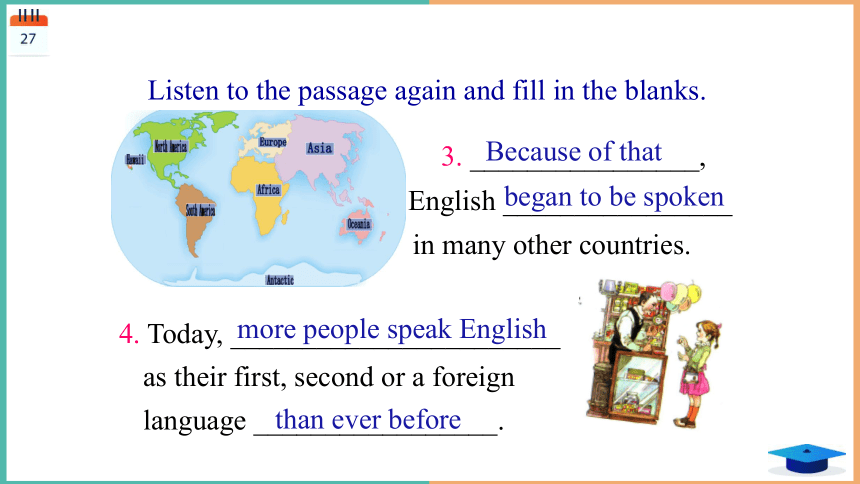
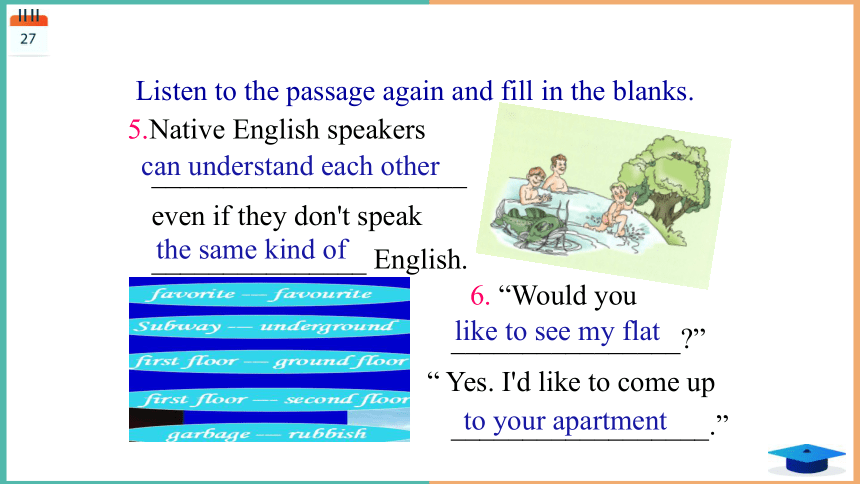
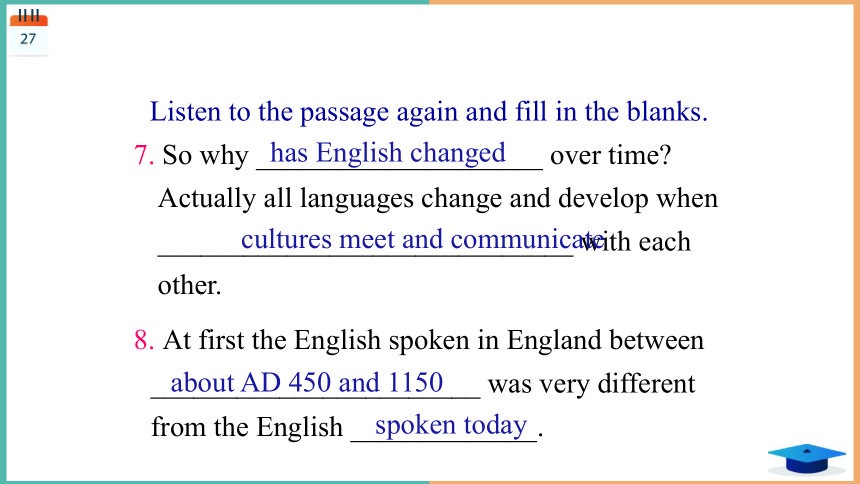
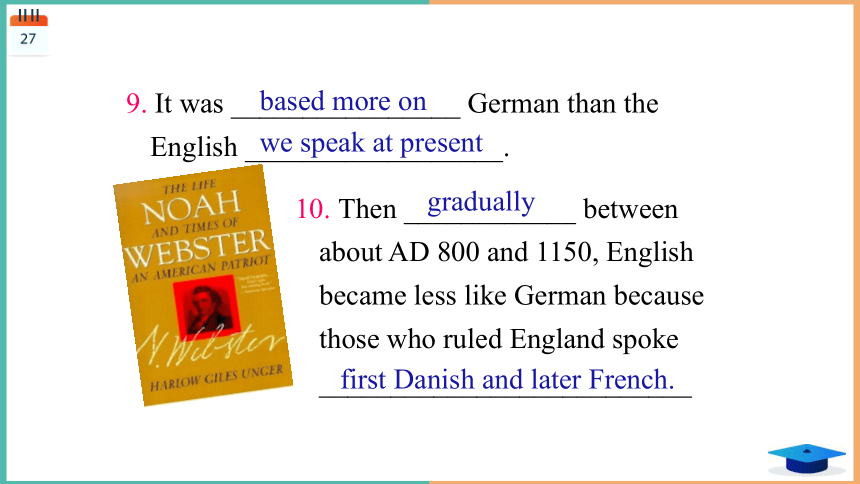


文档简介
人教版
高中英语
Unit
2
Reading
-2
English
Around
the
World
Recollect
the
passage
you've
learned.
Recollect
the
passage
you've
learned.
Read
the
passage
aloud
please.
Recall
the
scene
in
the
passage
when
reading.
Look
at
the
pictures
please
and
listen
to
the
passage
together
without
looking
at
your
text
book.
Listening
without
looking
at
your
text
book.
Listen
to
the
passage
again
and
fill
in
the
blanks.
1.
At
the
end
of
________________,
about
five
to
seven
million
people
spoke
English.
_____________________
lived
in
England.
2.
Later
in
the
next
century,
people
from
England
______________
to
___________
other
parts
of
the
world.
the
16th
century
Nearly
all
of
them
made
voyages
conquer
Listen
to
the
passage
again
and
fill
in
the
blanks.
3.
________________,
English
________________
in
many
other
countries.
began
to
be
spoken
Because
of
that
4.
Today,
_______________________
as
their
first,
second
or
a
foreign
language
_________________.
than
ever
before
more
people
speak
English
Listen
to
the
passage
again
and
fill
in
the
blanks.
5.Native
English
speakers
______________________
even
if
they
don't
speak
_______________
English.
6.
“Would
you
________________?”
“
Yes.
I'd
like
to
come
up
__________________.”
the
same
kind
of
can
understand
each
other
like
to
see
my
flat
to
your
apartment
Listen
to
the
passage
again
and
fill
in
the
blanks.
7.
So
why
____________________
over
time?
Actually
all
languages
change
and
develop
when
_____________________________
with
each
other.
8.
At
first
the
English
spoken
in
England
between
_______________________
was
very
different
from
the
English
_____________.
cultures
meet
and
communicate
has
English
changed
about
AD
450
and
1150
spoken
today
9.
It
was
________________
German
than
the
English
__________________.
based
more
on
we
speak
at
present
gradually
first
Danish
and
later
French.
10.
Then
____________
between
about
AD
800
and
1150,
English
became
less
like
German
because
those
who
ruled
England
spoke
__________________________
Listen
to
the
passage
again
and
fill
in
the
blanks.
11.
These
____________
enriched
the
English
language
and
______________________.
new
settlers
especially
its
vocabulary
language
was
settled
12.
Finally
by
the
19th
century
the
__________________.
At
that
time
two
big
changes
_____________________
happened.
in
English
spelling
Listen
to
the
passage
again
and
fill
in
the
blanks.
13.
First
Samuel
Johnson
_________________
and
later
Noah
Webster
wrote
______________________
of
the
English
Language.
The
American
Dictionary
wrote
his
dictionary
Listen
to
the
passage
again
and
fill
in
the
blanks.
14.
English
now
_______________
as
a
foreign
_________________
in
South
Asia.
is
also
spoken
or
second
language
15.
Today
___________________
learning
English
in
China
is
___________________.
increasing
rapidly
the
number
of
people
English
is
changing
over
time.
Native
English
speakers
can
understand
each
other
even
if
they
don't
speak
the
same
kind.
More
and
more
people
speak
English.
English
is
spoken
as
a
foreign
or
second
language
in
many
countries.
Paragraph
1.
The
two
big
changes
happened
in
English
spelling.
Paragraph2.
Paragraph3.
Paragraph4.
Paragraph5.
The
main
idea
of
each
paragraph
Comprehension
--
Exercise
1.
1.
English
had
most
speakers
in
the
17
century.
(because
after
the
17th
century,
more
people
began
to
speak
English
as
result
of
England
conquering
other
parts
of
the
world)
2.
English
developed
when
new
settlers
and
rulers
came
to
Britain.
3.
Languages
frequently
change.
(because
languages
don’t
change
often
but
only
when
people
come
into
close
contact)
F
T
F
Comprehension
--
Exercise
1.
4.
The
language
of
the
government
is
always
the
language
of
the
country.
(because
the
government
has
to
use
the
language
of
the
country
that
rules
it)
5.
English
is
one
of
the
official
languages
used
in
India.
6.
This
reading
describes
the
development
of
the
English
language.
F
T
T
Comprehension
--
Exercise
2
{5C22544A-7EE6-4342-B048-85BDC9FD1C3A}TIME
EVENTS
During
the
AD
450
--
800
English
was
based
more
on
German
Between
about
AD
800
and
1150
English
was
influenced
by
Danish
and
French
invaders
who
enriched
English
language.
By
the
1600's
Shakespeare
used
a
wider
vocabulary
than
ever
before.
In
1620
Some
British
settlers
moved
to
prehension
--
Exercise
2
{5C22544A-7EE6-4342-B048-85BDC9FD1C3A}TIME
EVENTS
From
the
18th
century
British
colonized
Australia,
and
English
began
to
be
spoken
in
Australia.
From
1756
to
1947
English
spoken
in
India.
By
19th
century
The
dictionaries
standardized
the
spelling
of
English,
and
the
English
language
was
prehension
--
Exercise
3
1.
Why
do
you
think
people
all
over
the
world
want
to
learn
English?
2.
Why
do
you
think
more
people
in
the
world
now
want
to
learn
Chinese?
3.
Do
you
think
it
matters
what
kind
of
English
you
learn?
Why?
Comprehension
--
Exercise
3
1.
Why
do
you
think
people
all
over
the
world
want
to
learn
English?
2.
Why
do
you
think
more
people
in
the
world
now
want
to
learn
Chinese?
3.
Do
you
think
it
matters
what
kind
of
English
you
learn?
Why?
Comprehension
--
Exercise
3
1.
Why
do
you
think
people
all
over
the
world
want
to
learn
English?
The
reasons
that
people
all
over
the
world
want
to
learn
English
are
as
the
following:
1)
With
economy
globalization,
English
has
become
the
best
bridge
to
serve
the
purpose
of
people
all
over
the
world
communicating
with
one
prehension
--
Exercise
3
1.
Why
do
you
think
people
all
over
the
world
want
to
learn
English?
2)
And
English
is
one
of
the
official
languages
of
the
Olympic
Games
and
the
United
Nations.
Also,
English
dominates
international
websites
and
provides
nearly
all
of
the
new
computer
terminology.
Comprehension
--
Exercise
3
1.
Why
do
you
think
people
all
over
the
world
want
to
learn
English?
3)
Tourism
and
trade
from
Western
Europe
and
North
America
has
contributed
to
the
spread
of
English.
4)
Satellite
TV,
radio
programs
and,
of
course,
Hollywood
films
all
broadcast
English
into
China.
Also,
a
number
of
Chinese
films
include
English
prehension
--
Exercise
3
1.
Why
do
you
think
people
all
over
the
world
want
to
learn
English?
5)
Like
all
major
languages
in
the
world,
English
is
always
changing.
In
order
to
adjust
to
native
speakers
from
different
parts
of
the
world,
it
is
a
must
for
people
all
over
the
world
to
learn
English,
whether
in
English
speaking
countries
or
in
non-English
speaking
prehension
--
Exercise
3
1.
Why
do
you
think
people
all
over
the
world
want
to
learn
English?
6)
People
from
different
parts
of
the
world
speak
English
with
various
accents
and
dialects,
and
people
have
to
learn
about
the
difference
between
different
kinds
of
English
in
order
to
avoid
misunderstanding
while
prehension
--
Exercise
3
2.
Why
do
you
think
more
people
in
the
world
now
want
to
learn
Chinese?
The
reason
that
more
and
more
foreigners
learn
Chinese
are
as
the
following:
1)
With
the
growing
strength
of
China
and
China’s
economic
power
and
the
world
gets
globalized,
China’s
growing
influence
in
the
United
Nation
too.
misunderstanding
while
communicating.
2.
Why
do
you
think
more
people
in
the
world
now
want
to
learn
Chinese?
2)
Growing
numbers
of
foreigners
are
showing
a
desire
to
learn
the
Chinese
language,
because
China’s
growing
influence
the
economy
of
the
prehension
--
Exercise
3
2.
Why
do
you
think
more
people
in
the
world
now
want
to
learn
Chinese?
3)
Along
with
the
economic
takeoff
of
China,
an
increasing
number
of
foreigners
have
been
learning
Chines,
the
ancient
language.
Some
of
them
are
interested
in
Chinese
culture,
such
as
Confucius,
Chinese
Kong-fu,
etc.
in
order
to
communicate
with
us
successfully.
Comprehension
--
Exercise
3
2.
Why
do
you
think
more
people
in
the
world
now
want
to
learn
Chinese?
4)
Most
of
people
in
the
world
want
to
have
the
trade
with
China.
The
people
in
western
move
their
branches
of
Western
companies
into
China.
Therefore,
they
like
to
learn
Chinese
very
prehension
--
Exercise
3
3.
Do
you
think
it
matters
what
kind
of
English
you
learn?
Why?
I
don’t
think
so.
The
reasons
are
as
follows:
1)
Native
speakers
from
different
parts
of
the
world
have
no
difficulty
in
understanding
each
other
despite
the
fact
that
they
speak
a
bit
differently.
Comprehension
--
Exercise
3
3.
Do
you
think
it
matters
what
kind
of
English
you
learn?
Why?
2)
It
is
necessary
for
us
to
learn
the
narrow
difference
between
different
kinds
of
English
if
we
hope
to
communicate
fluently
with
native
speakers
of
English
from
all
over
the
prehension
--
Exercise
3
3.
Do
you
think
it
matters
what
kind
of
English
you
learn?
Why?
3)
Different
kinds
of
English
have
the
same
language
core.
If
you
have
got
a
good
command
of
one
kind,
you
will
almost
have
no
difficulty
understanding
another
kind
of
English.
The
sample
dialogue:
S1:
What’s
the
passage
about?
S2:
It’s
about
the
history
of
English,
which
tells
us
the
development,
origin
and
change
of
English.
S1:
You
are
quite
right,
I
think
it
introduces
the
English
history
and
trend
of
development.
S2:Yes,
I
think
so.
Speaking
practice
The
sample
dialogue:
S1:
Do
you
know
what
does
the
word,
road,
mean?
S2:
Well.
In
my
opinion,
the
word,
road,
means
progress,
and
the
tittle
indicates
that
the
passage
tells
us
the
progress
of
the
development
in
English
language.
S1:
Could
you
tell
me
what
does
the
words,
“native
speaker”
mean?
Speaking
practice
The
sample
dialogue:
S2:
I
think
the
“native
speaker”
means
that
a
person
who
has
spoken
English
since
birth
but
who
may
not
speak
a
standard
from
of
it.
S1:
Thank
you
very
much!
S2:
You
are
welcome.
And
could
you
distinguish
native
speaker
and
mother
tongue.
Are
they
different?
Speaking
practice
The
sample
dialogue:
S1:
I
think
the
meaning
of
the
words
native
speaker
and
mother
tongue
are
the
same.
S2:
In
the
passage,
I
find
the
author
used
the
words,
world
Englishes,
and
I
think,
it
must
refer
to
a
family
of
different
varieties
of
English
used
by
nations
with
their
own
peculiarities
and
their
own
distinctive
vocabulary.
S1:
Yes,
you
are
quite
right.
Speaking
practice
Summary
1.
Reviewed
the
passage
and
listened
to
the
passage
again.
2.
Discuss
about
the
development
of
English.
3.
Fill
in
the
blanks
according
to
what
you
hear.
4.
Finished
the
exercises
on
the
textbook.
5.
Made
an
dialogue
about
the
passage
in
the
class.
We've
learned
the
following
in
the
class:
Homework
1.
Review
the
usage
of
the
words
and
phrases
in
the
passage
and
recited.
2.
Finish
the
exercises
and
read
the
reading
passage
aloud,
recite
some
of
the
sentence.
高中英语
Unit
2
Reading
-2
English
Around
the
World
Recollect
the
passage
you've
learned.
Recollect
the
passage
you've
learned.
Read
the
passage
aloud
please.
Recall
the
scene
in
the
passage
when
reading.
Look
at
the
pictures
please
and
listen
to
the
passage
together
without
looking
at
your
text
book.
Listening
without
looking
at
your
text
book.
Listen
to
the
passage
again
and
fill
in
the
blanks.
1.
At
the
end
of
________________,
about
five
to
seven
million
people
spoke
English.
_____________________
lived
in
England.
2.
Later
in
the
next
century,
people
from
England
______________
to
___________
other
parts
of
the
world.
the
16th
century
Nearly
all
of
them
made
voyages
conquer
Listen
to
the
passage
again
and
fill
in
the
blanks.
3.
________________,
English
________________
in
many
other
countries.
began
to
be
spoken
Because
of
that
4.
Today,
_______________________
as
their
first,
second
or
a
foreign
language
_________________.
than
ever
before
more
people
speak
English
Listen
to
the
passage
again
and
fill
in
the
blanks.
5.Native
English
speakers
______________________
even
if
they
don't
speak
_______________
English.
6.
“Would
you
________________?”
“
Yes.
I'd
like
to
come
up
__________________.”
the
same
kind
of
can
understand
each
other
like
to
see
my
flat
to
your
apartment
Listen
to
the
passage
again
and
fill
in
the
blanks.
7.
So
why
____________________
over
time?
Actually
all
languages
change
and
develop
when
_____________________________
with
each
other.
8.
At
first
the
English
spoken
in
England
between
_______________________
was
very
different
from
the
English
_____________.
cultures
meet
and
communicate
has
English
changed
about
AD
450
and
1150
spoken
today
9.
It
was
________________
German
than
the
English
__________________.
based
more
on
we
speak
at
present
gradually
first
Danish
and
later
French.
10.
Then
____________
between
about
AD
800
and
1150,
English
became
less
like
German
because
those
who
ruled
England
spoke
__________________________
Listen
to
the
passage
again
and
fill
in
the
blanks.
11.
These
____________
enriched
the
English
language
and
______________________.
new
settlers
especially
its
vocabulary
language
was
settled
12.
Finally
by
the
19th
century
the
__________________.
At
that
time
two
big
changes
_____________________
happened.
in
English
spelling
Listen
to
the
passage
again
and
fill
in
the
blanks.
13.
First
Samuel
Johnson
_________________
and
later
Noah
Webster
wrote
______________________
of
the
English
Language.
The
American
Dictionary
wrote
his
dictionary
Listen
to
the
passage
again
and
fill
in
the
blanks.
14.
English
now
_______________
as
a
foreign
_________________
in
South
Asia.
is
also
spoken
or
second
language
15.
Today
___________________
learning
English
in
China
is
___________________.
increasing
rapidly
the
number
of
people
English
is
changing
over
time.
Native
English
speakers
can
understand
each
other
even
if
they
don't
speak
the
same
kind.
More
and
more
people
speak
English.
English
is
spoken
as
a
foreign
or
second
language
in
many
countries.
Paragraph
1.
The
two
big
changes
happened
in
English
spelling.
Paragraph2.
Paragraph3.
Paragraph4.
Paragraph5.
The
main
idea
of
each
paragraph
Comprehension
--
Exercise
1.
1.
English
had
most
speakers
in
the
17
century.
(because
after
the
17th
century,
more
people
began
to
speak
English
as
result
of
England
conquering
other
parts
of
the
world)
2.
English
developed
when
new
settlers
and
rulers
came
to
Britain.
3.
Languages
frequently
change.
(because
languages
don’t
change
often
but
only
when
people
come
into
close
contact)
F
T
F
Comprehension
--
Exercise
1.
4.
The
language
of
the
government
is
always
the
language
of
the
country.
(because
the
government
has
to
use
the
language
of
the
country
that
rules
it)
5.
English
is
one
of
the
official
languages
used
in
India.
6.
This
reading
describes
the
development
of
the
English
language.
F
T
T
Comprehension
--
Exercise
2
{5C22544A-7EE6-4342-B048-85BDC9FD1C3A}TIME
EVENTS
During
the
AD
450
--
800
English
was
based
more
on
German
Between
about
AD
800
and
1150
English
was
influenced
by
Danish
and
French
invaders
who
enriched
English
language.
By
the
1600's
Shakespeare
used
a
wider
vocabulary
than
ever
before.
In
1620
Some
British
settlers
moved
to
prehension
--
Exercise
2
{5C22544A-7EE6-4342-B048-85BDC9FD1C3A}TIME
EVENTS
From
the
18th
century
British
colonized
Australia,
and
English
began
to
be
spoken
in
Australia.
From
1756
to
1947
English
spoken
in
India.
By
19th
century
The
dictionaries
standardized
the
spelling
of
English,
and
the
English
language
was
prehension
--
Exercise
3
1.
Why
do
you
think
people
all
over
the
world
want
to
learn
English?
2.
Why
do
you
think
more
people
in
the
world
now
want
to
learn
Chinese?
3.
Do
you
think
it
matters
what
kind
of
English
you
learn?
Why?
Comprehension
--
Exercise
3
1.
Why
do
you
think
people
all
over
the
world
want
to
learn
English?
2.
Why
do
you
think
more
people
in
the
world
now
want
to
learn
Chinese?
3.
Do
you
think
it
matters
what
kind
of
English
you
learn?
Why?
Comprehension
--
Exercise
3
1.
Why
do
you
think
people
all
over
the
world
want
to
learn
English?
The
reasons
that
people
all
over
the
world
want
to
learn
English
are
as
the
following:
1)
With
economy
globalization,
English
has
become
the
best
bridge
to
serve
the
purpose
of
people
all
over
the
world
communicating
with
one
prehension
--
Exercise
3
1.
Why
do
you
think
people
all
over
the
world
want
to
learn
English?
2)
And
English
is
one
of
the
official
languages
of
the
Olympic
Games
and
the
United
Nations.
Also,
English
dominates
international
websites
and
provides
nearly
all
of
the
new
computer
terminology.
Comprehension
--
Exercise
3
1.
Why
do
you
think
people
all
over
the
world
want
to
learn
English?
3)
Tourism
and
trade
from
Western
Europe
and
North
America
has
contributed
to
the
spread
of
English.
4)
Satellite
TV,
radio
programs
and,
of
course,
Hollywood
films
all
broadcast
English
into
China.
Also,
a
number
of
Chinese
films
include
English
prehension
--
Exercise
3
1.
Why
do
you
think
people
all
over
the
world
want
to
learn
English?
5)
Like
all
major
languages
in
the
world,
English
is
always
changing.
In
order
to
adjust
to
native
speakers
from
different
parts
of
the
world,
it
is
a
must
for
people
all
over
the
world
to
learn
English,
whether
in
English
speaking
countries
or
in
non-English
speaking
prehension
--
Exercise
3
1.
Why
do
you
think
people
all
over
the
world
want
to
learn
English?
6)
People
from
different
parts
of
the
world
speak
English
with
various
accents
and
dialects,
and
people
have
to
learn
about
the
difference
between
different
kinds
of
English
in
order
to
avoid
misunderstanding
while
prehension
--
Exercise
3
2.
Why
do
you
think
more
people
in
the
world
now
want
to
learn
Chinese?
The
reason
that
more
and
more
foreigners
learn
Chinese
are
as
the
following:
1)
With
the
growing
strength
of
China
and
China’s
economic
power
and
the
world
gets
globalized,
China’s
growing
influence
in
the
United
Nation
too.
misunderstanding
while
communicating.
2.
Why
do
you
think
more
people
in
the
world
now
want
to
learn
Chinese?
2)
Growing
numbers
of
foreigners
are
showing
a
desire
to
learn
the
Chinese
language,
because
China’s
growing
influence
the
economy
of
the
prehension
--
Exercise
3
2.
Why
do
you
think
more
people
in
the
world
now
want
to
learn
Chinese?
3)
Along
with
the
economic
takeoff
of
China,
an
increasing
number
of
foreigners
have
been
learning
Chines,
the
ancient
language.
Some
of
them
are
interested
in
Chinese
culture,
such
as
Confucius,
Chinese
Kong-fu,
etc.
in
order
to
communicate
with
us
successfully.
Comprehension
--
Exercise
3
2.
Why
do
you
think
more
people
in
the
world
now
want
to
learn
Chinese?
4)
Most
of
people
in
the
world
want
to
have
the
trade
with
China.
The
people
in
western
move
their
branches
of
Western
companies
into
China.
Therefore,
they
like
to
learn
Chinese
very
prehension
--
Exercise
3
3.
Do
you
think
it
matters
what
kind
of
English
you
learn?
Why?
I
don’t
think
so.
The
reasons
are
as
follows:
1)
Native
speakers
from
different
parts
of
the
world
have
no
difficulty
in
understanding
each
other
despite
the
fact
that
they
speak
a
bit
differently.
Comprehension
--
Exercise
3
3.
Do
you
think
it
matters
what
kind
of
English
you
learn?
Why?
2)
It
is
necessary
for
us
to
learn
the
narrow
difference
between
different
kinds
of
English
if
we
hope
to
communicate
fluently
with
native
speakers
of
English
from
all
over
the
prehension
--
Exercise
3
3.
Do
you
think
it
matters
what
kind
of
English
you
learn?
Why?
3)
Different
kinds
of
English
have
the
same
language
core.
If
you
have
got
a
good
command
of
one
kind,
you
will
almost
have
no
difficulty
understanding
another
kind
of
English.
The
sample
dialogue:
S1:
What’s
the
passage
about?
S2:
It’s
about
the
history
of
English,
which
tells
us
the
development,
origin
and
change
of
English.
S1:
You
are
quite
right,
I
think
it
introduces
the
English
history
and
trend
of
development.
S2:Yes,
I
think
so.
Speaking
practice
The
sample
dialogue:
S1:
Do
you
know
what
does
the
word,
road,
mean?
S2:
Well.
In
my
opinion,
the
word,
road,
means
progress,
and
the
tittle
indicates
that
the
passage
tells
us
the
progress
of
the
development
in
English
language.
S1:
Could
you
tell
me
what
does
the
words,
“native
speaker”
mean?
Speaking
practice
The
sample
dialogue:
S2:
I
think
the
“native
speaker”
means
that
a
person
who
has
spoken
English
since
birth
but
who
may
not
speak
a
standard
from
of
it.
S1:
Thank
you
very
much!
S2:
You
are
welcome.
And
could
you
distinguish
native
speaker
and
mother
tongue.
Are
they
different?
Speaking
practice
The
sample
dialogue:
S1:
I
think
the
meaning
of
the
words
native
speaker
and
mother
tongue
are
the
same.
S2:
In
the
passage,
I
find
the
author
used
the
words,
world
Englishes,
and
I
think,
it
must
refer
to
a
family
of
different
varieties
of
English
used
by
nations
with
their
own
peculiarities
and
their
own
distinctive
vocabulary.
S1:
Yes,
you
are
quite
right.
Speaking
practice
Summary
1.
Reviewed
the
passage
and
listened
to
the
passage
again.
2.
Discuss
about
the
development
of
English.
3.
Fill
in
the
blanks
according
to
what
you
hear.
4.
Finished
the
exercises
on
the
textbook.
5.
Made
an
dialogue
about
the
passage
in
the
class.
We've
learned
the
following
in
the
class:
Homework
1.
Review
the
usage
of
the
words
and
phrases
in
the
passage
and
recited.
2.
Finish
the
exercises
and
read
the
reading
passage
aloud,
recite
some
of
the
sentence.
